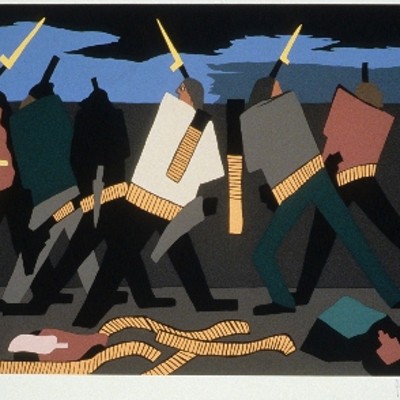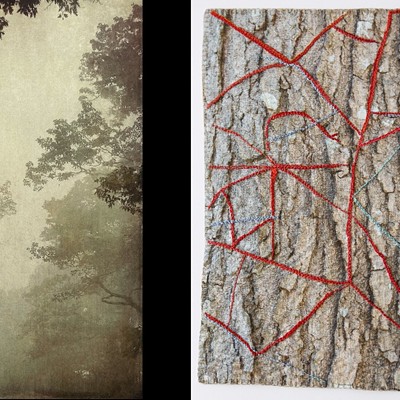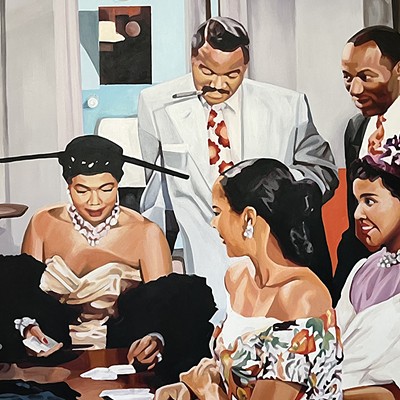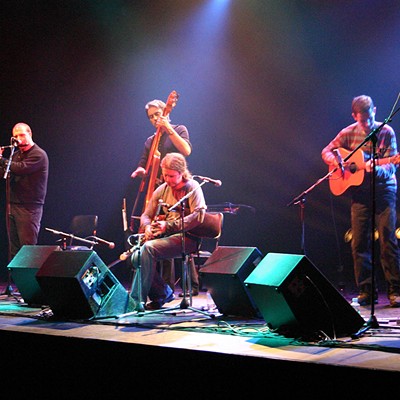He wasn't an author yet; just 19, he was a fresh college dropout, traveling around the country, working on farms here and there. On one ride, he thought he was being funny when he joked to the driver about the dangers of hitchhiking in hillbilly country. The driver pulled over and slammed on the brakes.
"Get out," he said.
Biggers apologized, explaining he had spent his early childhood in the hill country of Southern Illinois, before moving on to Tucson.
"I'm a hillbilly, too," he added.
"We don't use that word anymore," the man replied. But he offered to take Biggers to the Appalachian South Folklife Center in West Virginia so the young man could learn the truth about mountain culture. There, Biggers met the center's founder, poet and activist Don West, who told him, "You can't understand America until you understand Appalachia."
That was the beginning of Biggers' decades-long quest to learn everything he could about life in the mountains. He's written about it here and there, in magazines and for radio, and now he's published a provocatively titled book: The United States of Appalachia: How Southern Mountaineers Brought Independence, Culture, and Enlightenment to America.
"Appalachia has an extraordinary history," he says in a telephone interview from his home in Illinois, where he now lives with his Italian-born wife and two small children. "It's always been an arena for America, with its proximity to the eastern seaboard and its proximity to what was the frontier. It's a bridge between East and West, North and South."
Biggers, who founded the well-known Northern Arizona Book Festival in Flagstaff, kicks off a national book tour this Friday night, back in his hometown of Tucson. He'll do readings and host an evening of live mountain music at the Rialto Theatre, run by his brother Doug Biggers, former publisher of the Tucson Weekly.
"It will be like an old-fashioned radio show," says Jeff Biggers, who will act as narrator, while musicians Lisa Otey, Tom Walbank and Tim Wiedenkeller serve up a surprisingly rich sampling of music. Appalachian music is not just the traditional British ballads, but everything from jazz and blues to soul to gospel and country, Biggers says. "Appalachia is a crossroads of music, especially African-American. It's beyond your imagination what came out of there."
Nina Simone, profiled in the book, had a repertoire "that defied categories. She came from backwoods North Carolina and studied at Juilliard. She performed Scottish-English ballads, church and gospel music, jazz and soul."
The Appalachian Mountains arc diagonally some 1,600 miles across the East, from Northern Mississippi clear on up to the Gaspé Peninsula in Quebec.
"All of these places have unique mountain cultures," Biggers says, but his book focuses on Appalachia as it's commonly understood. He writes about the southern mountains stretching from Northern Alabama and into Western Pennsylvania, and taking in parts of the Carolinas, Tennessee, Virginia, West Virginia, Kentucky and Ohio.
Contrary to their stereotype as a "quaint backwater" inhabited only by whites, the Appalachians were also home to African Americans and Cherokee Indians, and they spawned important political and artistic rebellions, Biggers argues. The coal-rich region has long been known for its labor uprisings and struggles for miners' rights, but despite its preponderance of slave-holding states, it also produced abolitionists. The Highlander Folk Center in Tennessee later helped train civil rights workers, including Rosa Parks.
Biggers writes that colonial-era Appalachians intent on "life, liberty and property" set up an independent state in Eastern Tennessee in defiance of the British--in 1771, five years before the Declaration of Independence. Years before the Cherokees were banished on the Trail of Tears, the Cherokee sage Sequoyah concocted a written version of his language, a first for any Native American tribe, and the newly literate Indians rushed to write books and newspapers.
Many journalists and writers with an environmental bent--including Willa Cather, Edward Abbey and Barbara Kingsolver, all best known for their Southwestern work--sprang from the Eastern mountains.
Abbey, the fierce lover of the land, "grew up in the Southwest Pennsylvania hills, in the mountains and forest, and they reflected his love of nature," Biggers says. "Kingsolver was from Eastern Kentucky, and Cather was from backwoods Virginia. Appalachian writers view literature as a reflection of the land. How can you write about the mountains if you destroy them?"
Nowadays, mining companies intent on "mountain top removal" are doing exactly that, he says. "Mountain top removal is the most extreme form of strip mining. They knock down the mountain into the valley, into the streams. It's easy and cheap, a dirty way of getting coal. Later, when you have flooding, you don't have natural gulleys. Villages get washed out. You may not lose your husband in the mine, but you'll lose your whole family in the spring."
Mountain top removal is attractive to mining companies, because it requires so few workers, and long-term environmental damage is less likely to draw headlines than the short-term horror of miners trapped by an explosion. As the deaths of 12 miners in the recent Sago mining disaster in West Virginia so poignantly reminded the nation, "Mining has always been a ruthless industry," says Biggers, whose own grandfather was a miner who died of black lung. "They take things out in the cheapest possible ways."
The book recounts some of the long struggles by Appalachian miners, white and black, for a decent wage and safe working conditions. One historian noted that a "U.S. soldier in World War I had a better chance of surviving on the field of combat than did a miner in a West Virginia mine." The murders during labor battles once won the coal country of Harlan County, Ky., the dubious distinction of the capital of rural homicide.
But some of the gains made by the United Mine Workers have been lost. The Sago mine was a non-union shop plagued by hundreds of safety violations, as newspapers were quick to discover after the tragedy. The captains of the mining industry, Biggers asserts, are "Bush's buddies. They're unfettered and unleashed."
The author says he wanted to end his book with a call to environmental consciousness. If Appalachia is America, then it is "our mountains ... our American mountains" that are being destroyed, he writes. The question is whether the "rest of the county will 'come up to these hills and mountains' and join them."











